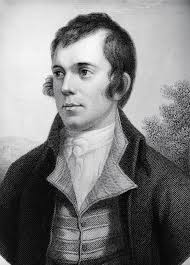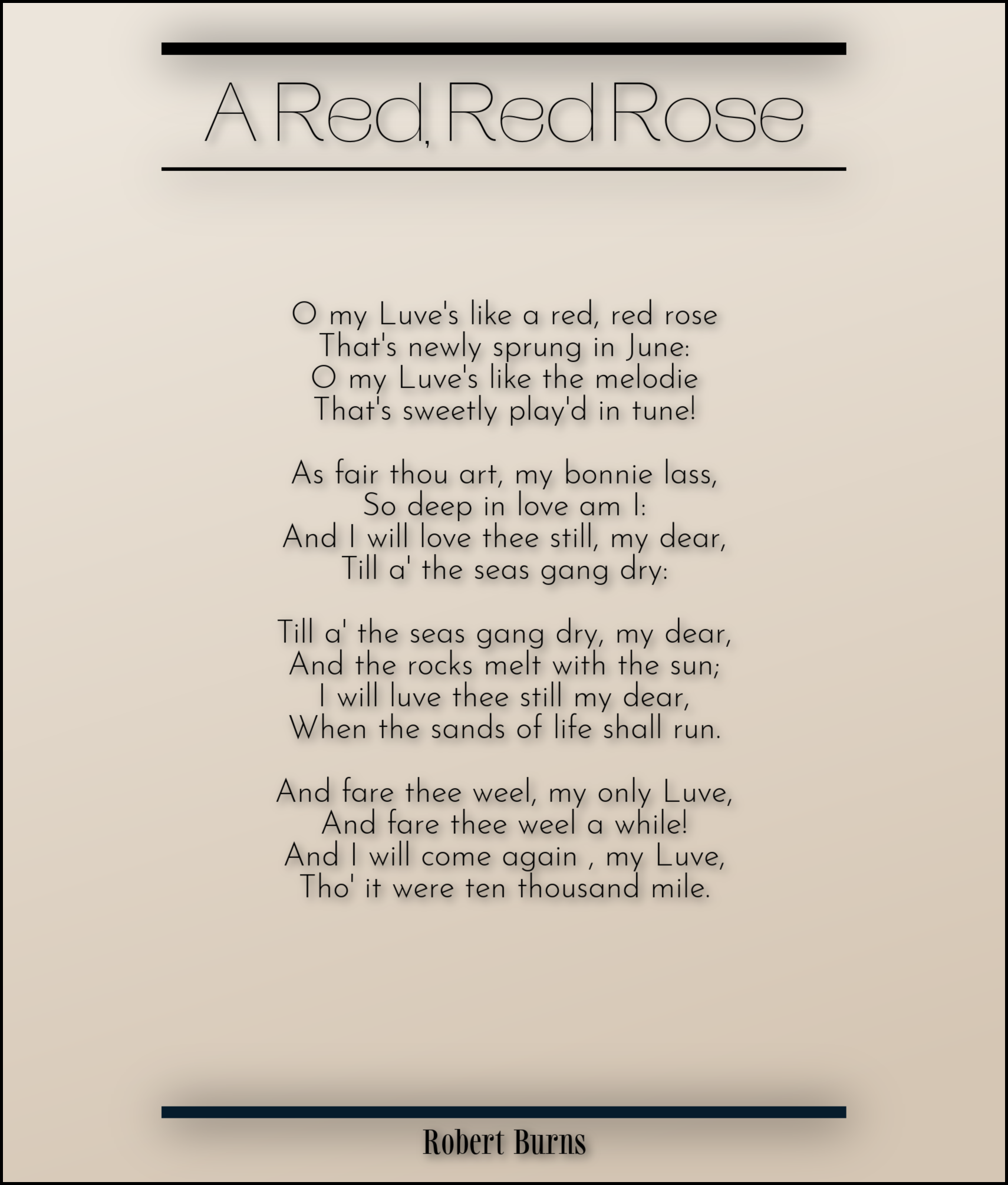
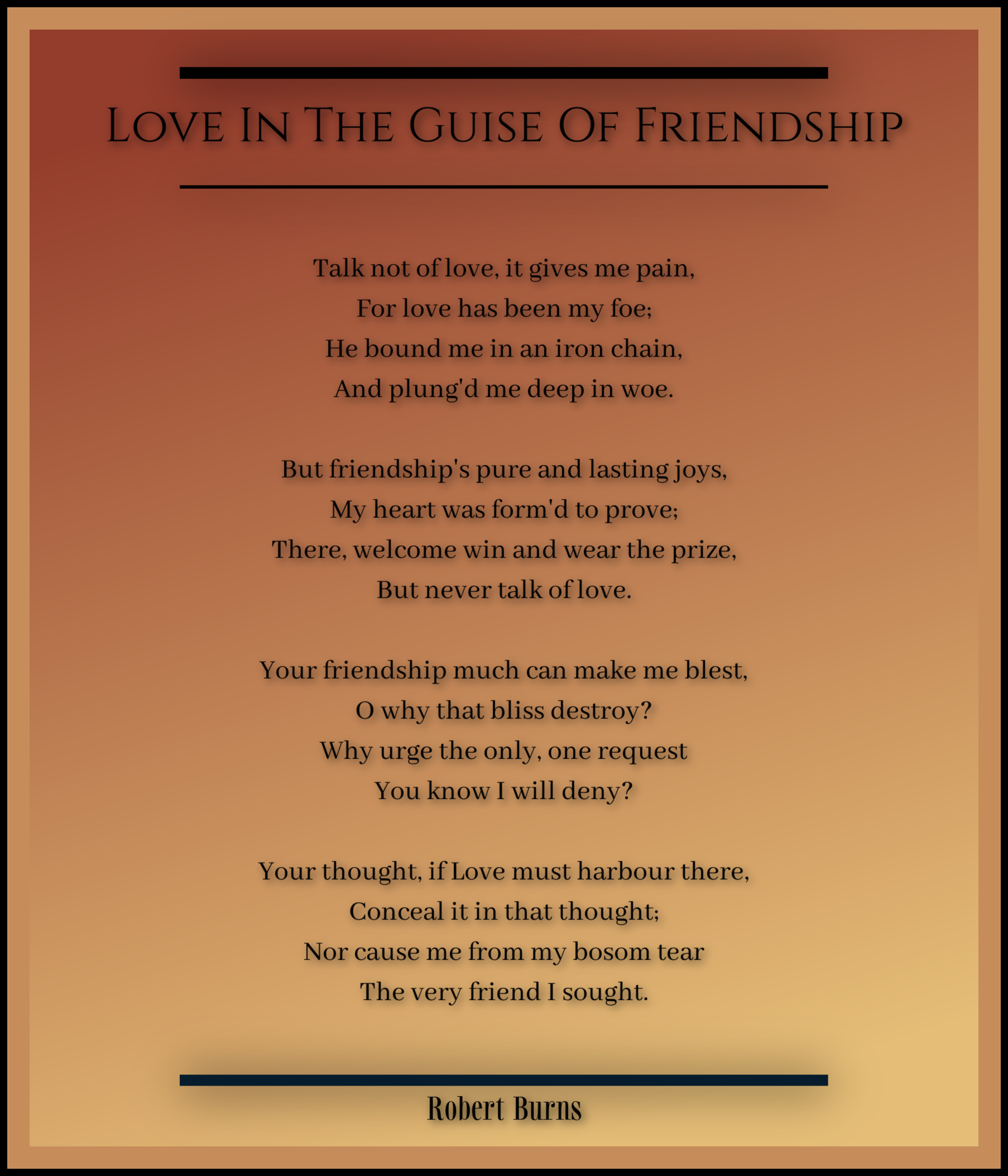
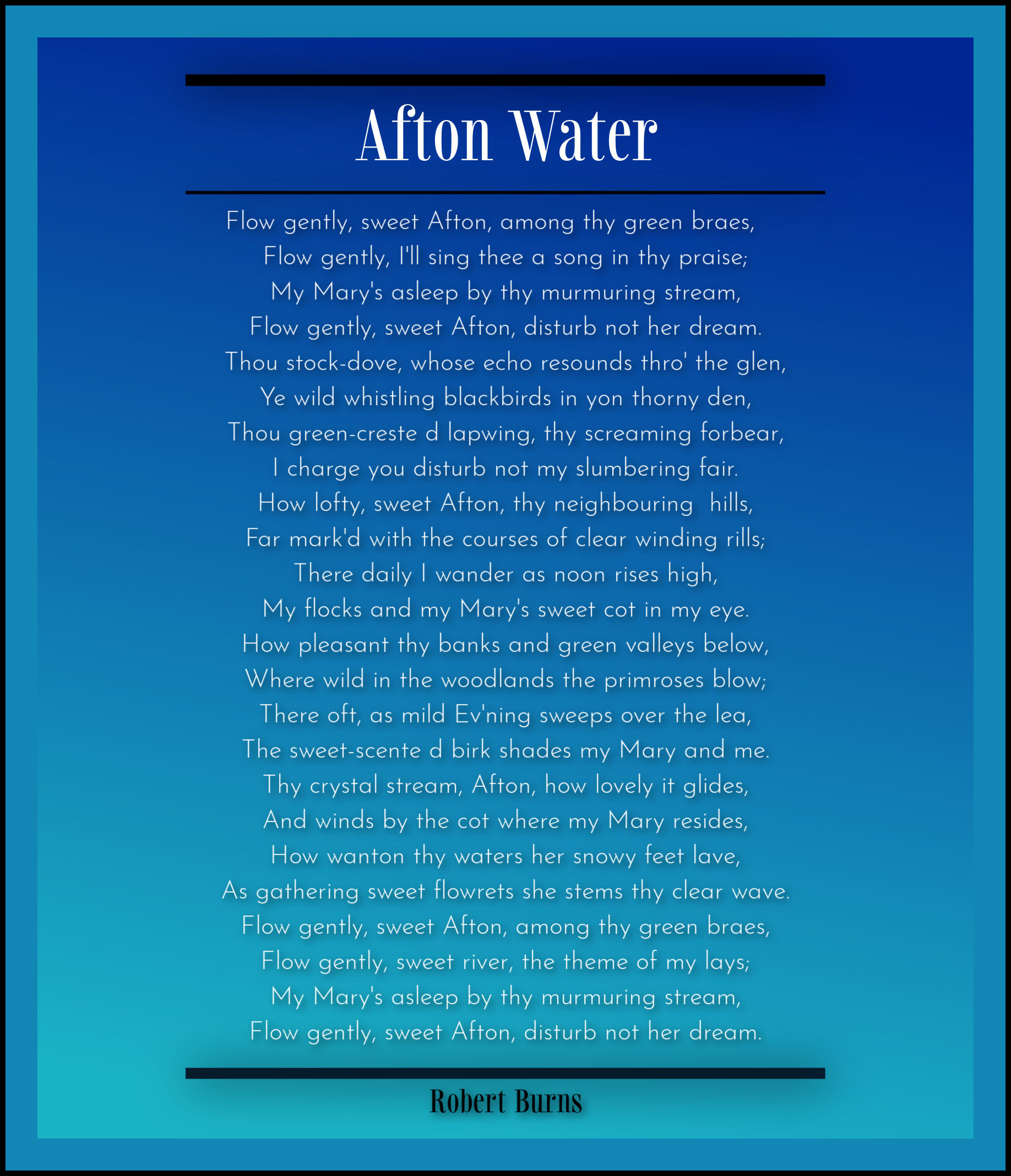
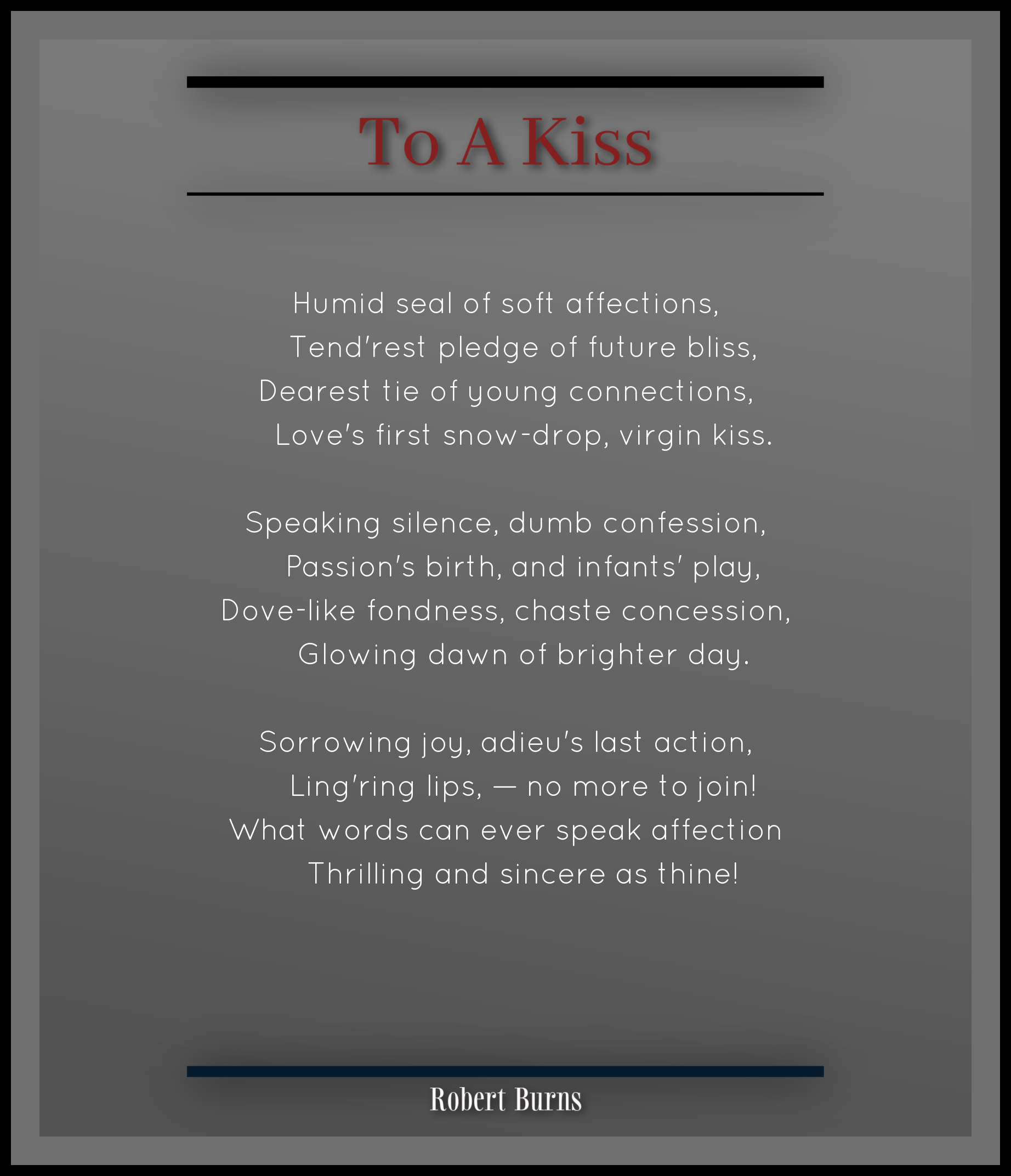
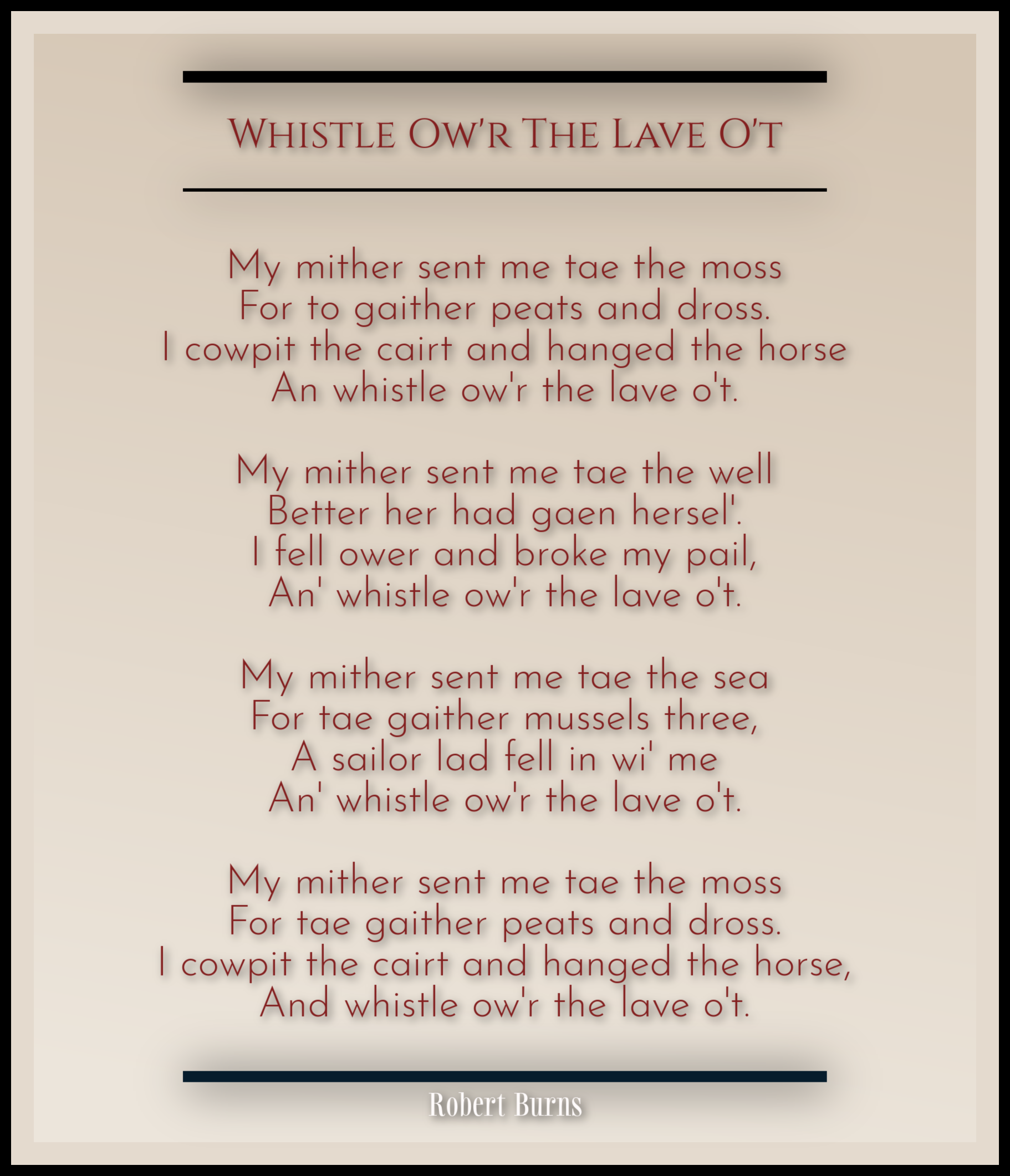
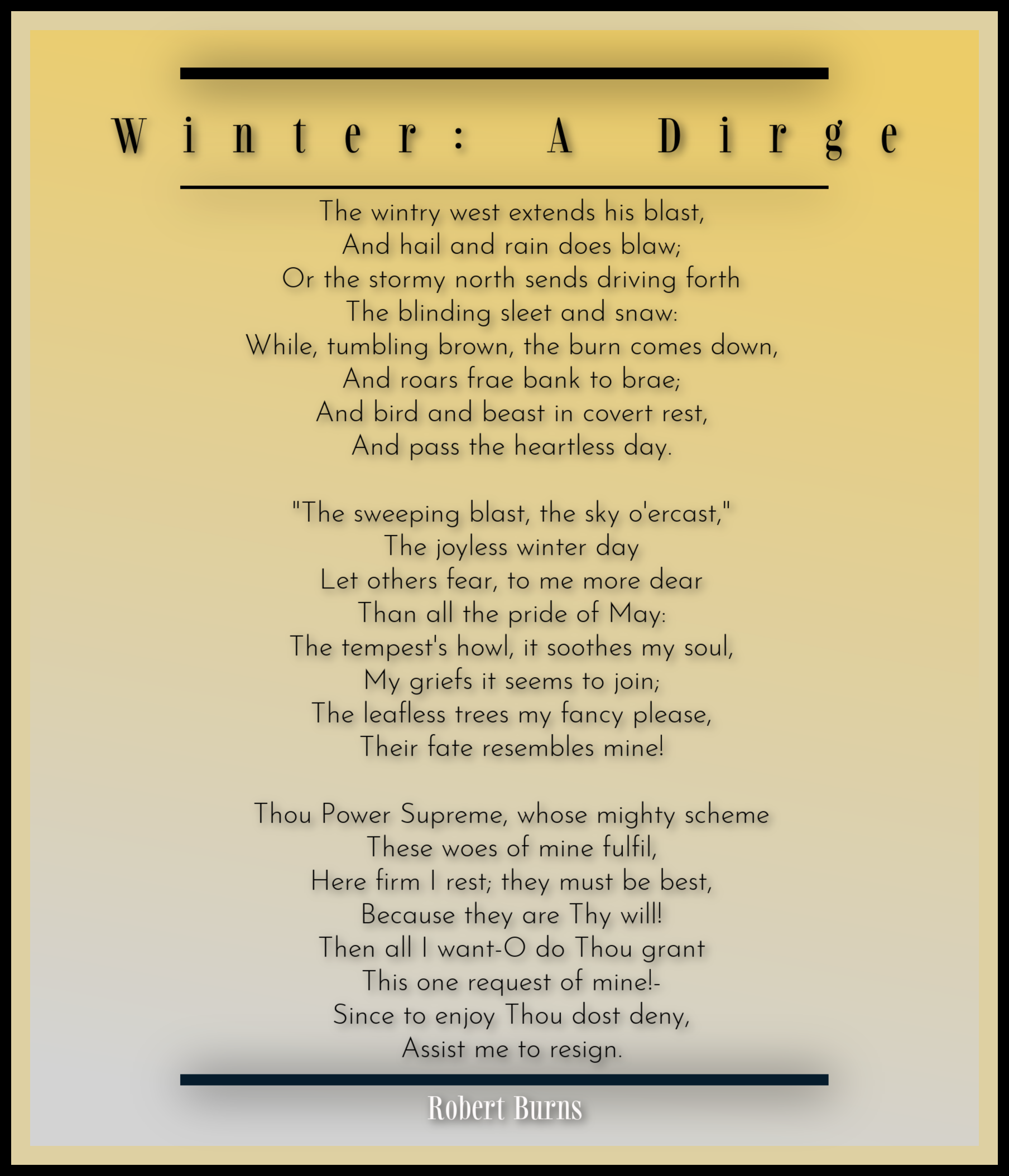
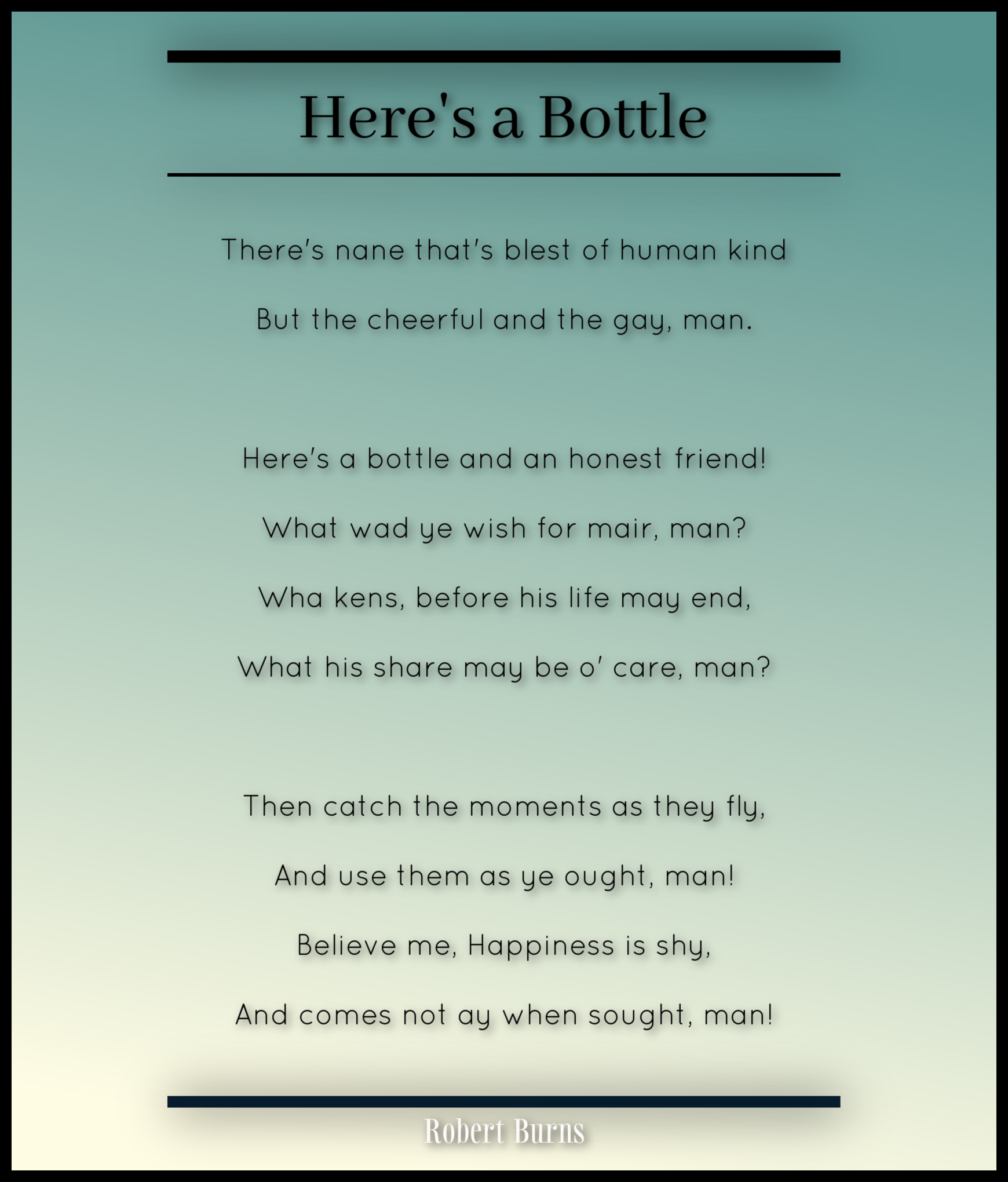
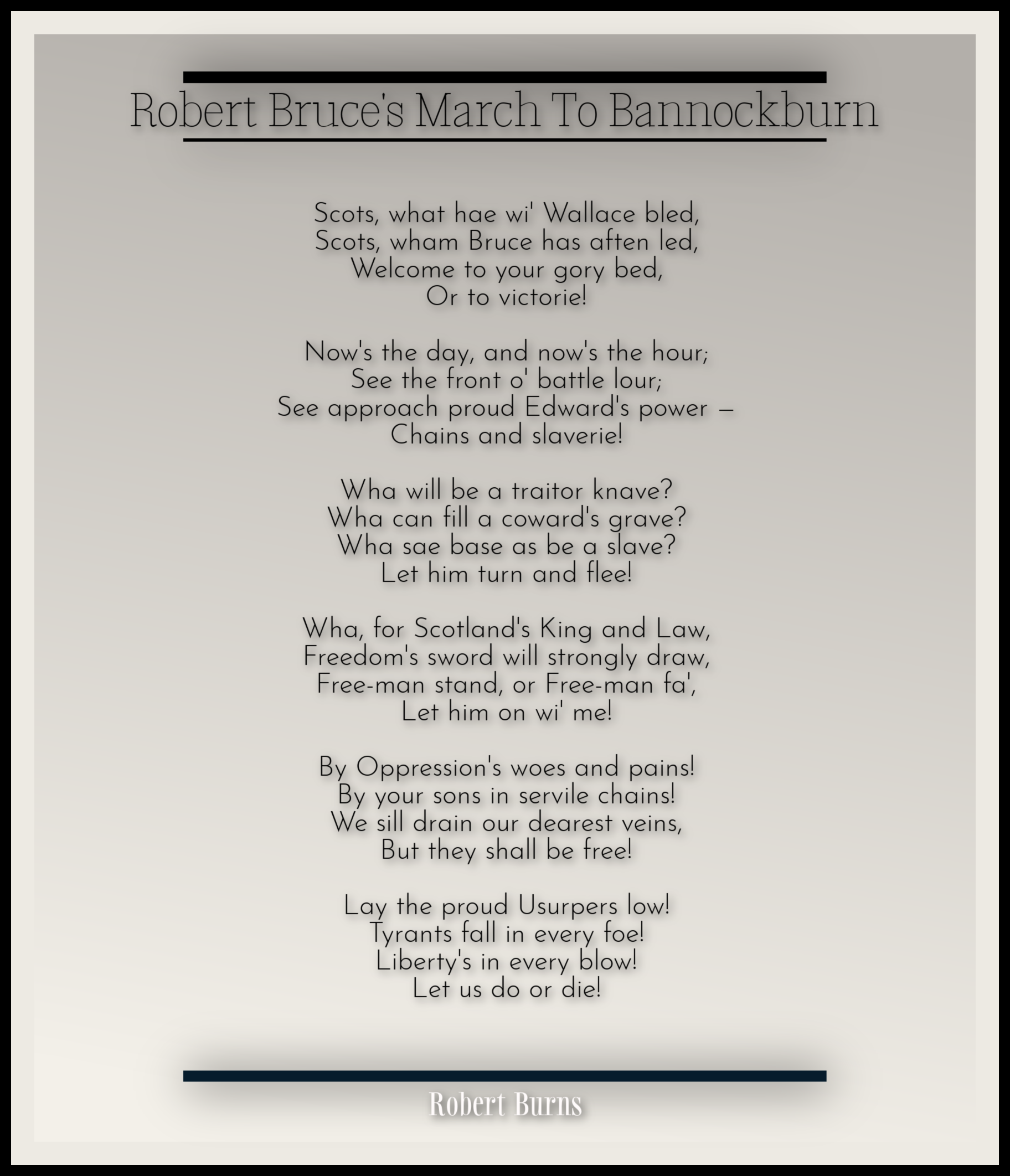
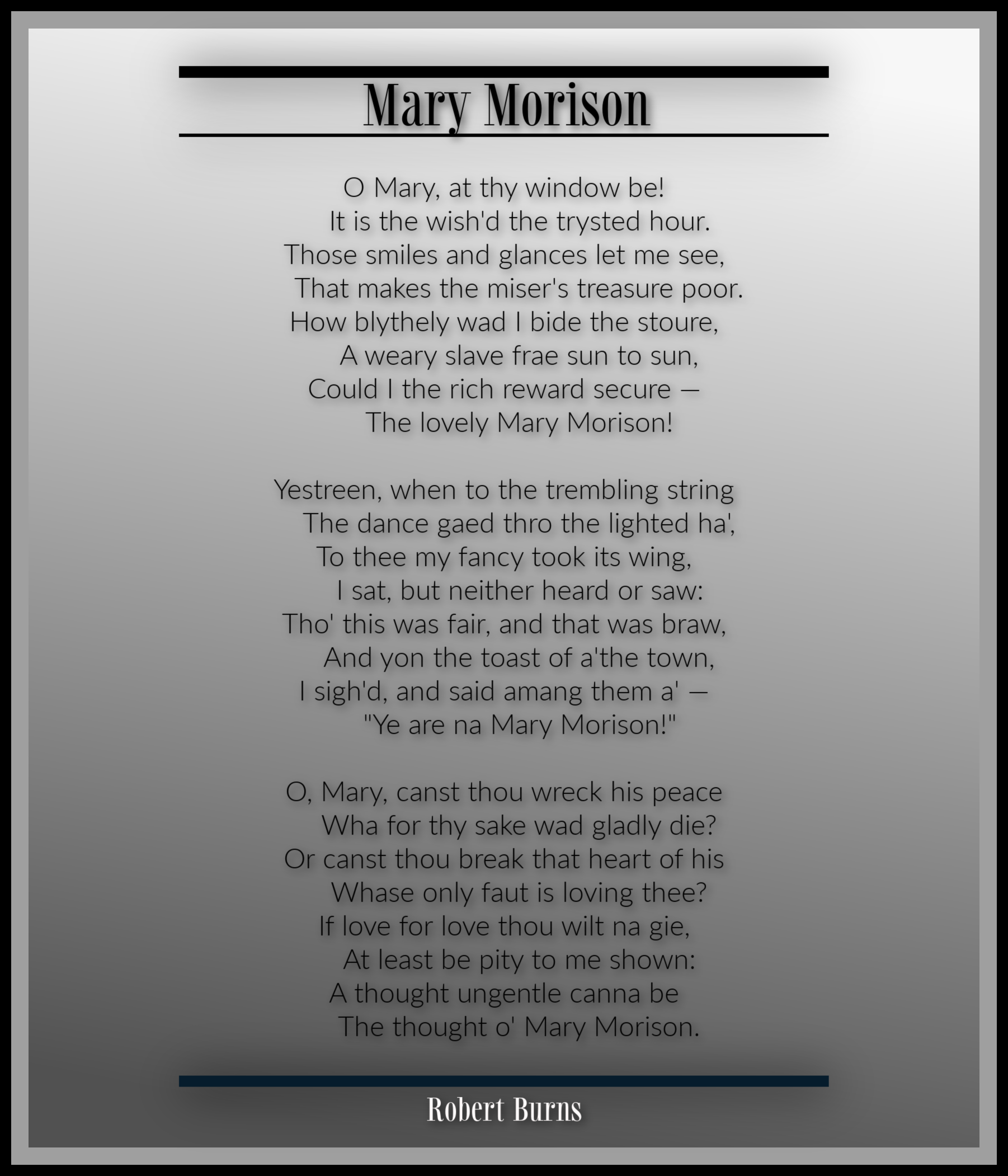
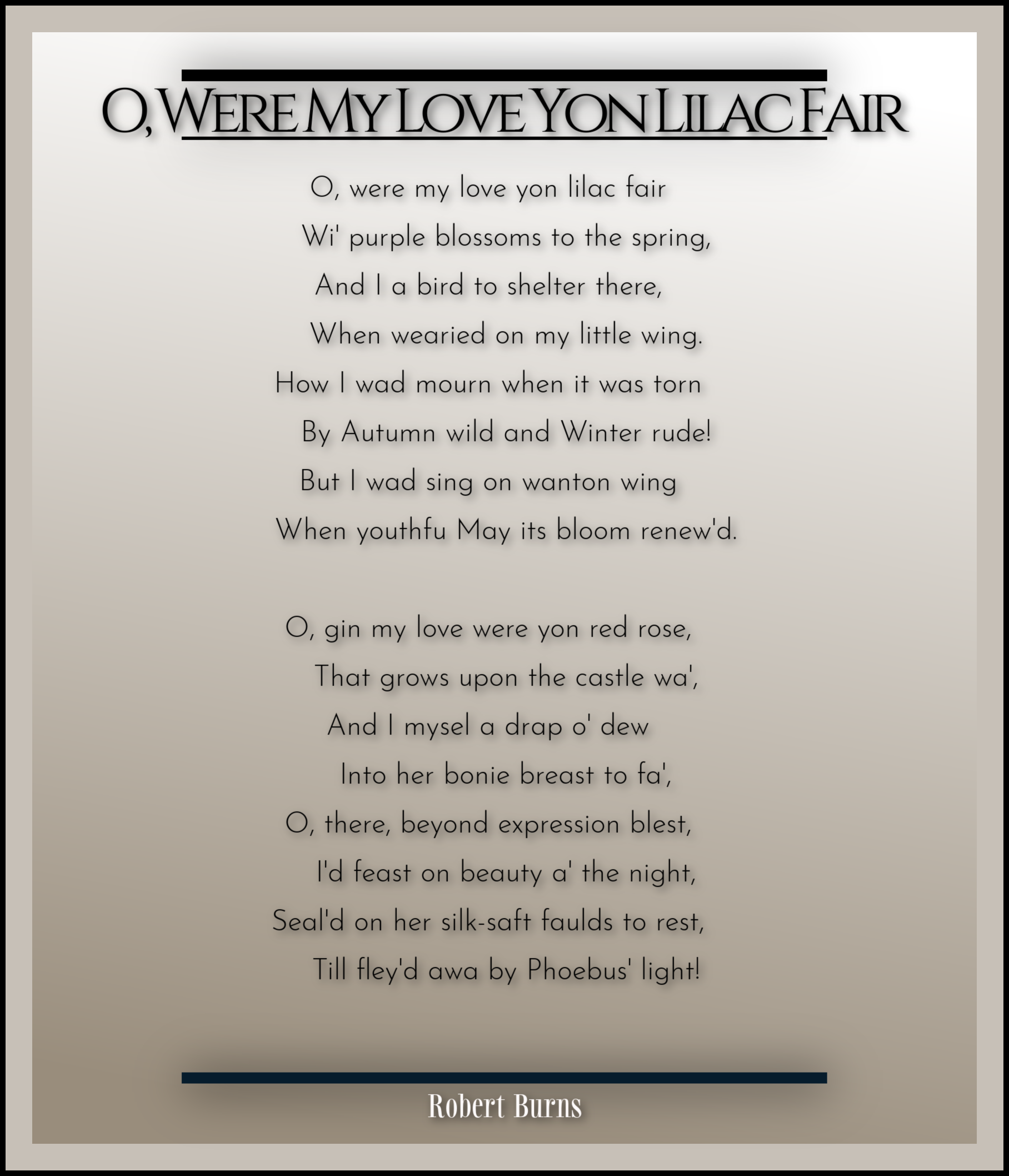
My Spouse Nancy
"Husband, husband, cease your strife,
Nor longer idly rave, Sir;
Tho' I am your wedded wife
Yet I am not your slave, Sir."
~~~~
"One of two must still obey,
Nancy, Nancy;
Is it Man or Woman, say,
My spouse Nancy?'
"If 'tis still the lordly word,
Service and obedience;
I'll desert my sov'reign lord,
And so, good bye, allegiance!"
~~~~
"Sad shall I be, so bereft,
Nancy, Nancy;
Yet I'll try to make a shift,
My spouse Nancy."
"My poor heart, then break it must,
My last hour I am near it:
When you lay me in the dust,
Think how you will bear it."
~~~~
"I will hope and trust in Heaven,
Nancy, Nancy;
Strength to bear it will be given,
My spouse Nancy."
"Well, Sir, from the silent dead,
Still I'll try to daunt you;
Ever round your midnight bed
Horrid sprites shall haunt you!"
~~~~
"I'll wed another like my dear
Nancy, Nancy;
Then all hell will fly for fear,
My spouse Nancy."
My Eppie Macnab
O saw ye my dearie, my Eppie Macnab?
O saw ye my dearie, my Eppie Macnab?
She's down in the yard, she's kissin the laird,
She winna come hame to her ain Jock Rab.
O come thy ways to me, my Eppie Macnab;
O come thy ways to me, my Eppie Macnab;
Whate'er thou hast dune, be it late, be it sune,
Thou's welcome again to thy ain Jock Rab.
What says she, my dearie, my Eppie Macnab?
What says she, my dearie, my Eppie Macnab?
She let's thee to wit that she has thee forgot,
And for ever disowns thee, her ain Jock Rab.
O had I ne'er seen thee, my Eppie Macnab!
O had I ne'er seen thee, my Eppie Macnab!
As light as the air, and as fause as thou's fair,
Thou's broken the heart o' thy ain Jock Rab.
Auld Lang Syne
Should auld acquaintance be forgot,
And never brought to mind?
Should auld acquaintance be forgot,
And auld lang syne!
Chorus:
For auld lang syne, my jo,
For auld lang syne,
We'll tak a cup o' kindness yet
For auld lang syne.
And surely you'll be your pint stoup,
And surely I'll be mine,
And we'll tak a cup o' kindness yet
For auld lang syne!
Chorus
We twa hae ran about the braes,
And pou'd the gowans fine,
But we've wander'd monie a weary fit
Sin' auld lang syne.
Chorus
We twa hae paidl'd in the burn
Frae morning sun til dine,
But seas between us braid hae roar'd
Sin' auld lang syne.
Chorus
And there's a hand, my trusty fiere,
And gie's a hand o' thine,
And we'll tak a right gude willie waught
For auld lang syne!
Chorus
English version
Days Long Ago
Should old acquaintances be forgotten
And never be remembered?
Should old acquaintances be forgotten
and days long ago.
Chorus:
For days long ago, my dear,
For days long ago
We'll drink a cup of kindness yet
For days long ago!
And surely you'll have your pint tankard
And surely I'll have mine.
And we'll drink a cup of kindness yet
For days long ago.
Chorus
We two have run about the hills
And pulled the daisies fine
But we've wandered many a weary mile
Since the days long ago.
Chorus
We two have paddled in the stream
From morning sun till dinner-time
But the broad seas have roared between us
Since the days long ago.
Chorus
And here's my hand, my trusty friend,
And give me your hand too,
And we will take an excellent good-will drink
For the days of long ago.
A Poets Welcome To His Love-Begotten Daughter
Thou's welcome, wean; mishanter fa' me,
If thoughts o' thee, or yet thy mammie,
Shall ever daunton me or awe me,
My sweet wee lady,
Or if I blush when thou shalt ca' me
Tyta or daddie.
Tho' now they ca' me fornicator,
An' tease my name in countra clatter,
The mair they talk, I'm kend the better,
E'en let them clash;
An auld wife's tongue's a feckless matter
To gie ane fash.
Welcome! my bonie, sweet, wee dochter,
Tho' ye come here a wee unsought for,
And tho' your comin' I hae fought for,
Baith kirk and queir;
Yet, by my faith, ye're no unwrought for,
That I shall swear!
Sweet fruit o' monie a merry dint,
My funny toil is no a' tint,
Tho' thou cam to the warl' asklent,
Which fools may scoff at;
In my last plack thy part's be in't
The better ha'f o't.
Tho' I should be the waur bestead,
Thou's be as braw and bienly clad,
And thy young years as nicely bred
Wi' education,
As onie brat o' wedlock's bed,
In a' thy station.
Wee image o' my bonie Betty,
As fatherly I kiss and daut thee,
As dear and near my heart I set thee
Wi' as gude will
As a' the priests had seen me get thee
That's out o' hell.
Lord grant that thou may aye inherit
Thy mither's person, grace, an' merit,
An' thy poor, worthless daddy's spirit,
Without his failins,
'Twill please me mair to see thee heir it,
Than stockit mailens.
For if thou be what I wad hae thee,
And tak the counsel I shall gie thee,
I'll never rue my trouble wi' thee -
The cost nor shame o't,
But be a loving father to thee,
And brag the name o't.
Address To A Haggis
Fair fa' your honest, sonsie face,
Great chieftain o' the puddin-race!
Aboon them a' ye tak your place,
Painch, tripe, or thairm:
Weel are ye wordy of a grace
As lang's my arm.
The groaning trencher there ye fill,
Your hurdies like a distant hill,
Your pin wad help to mend a mill
In time o' need,
While thro' your pores the dews distil
Like amber bead.
His knife see rustic Labour dight,
An' cut ye up wi' ready slight,
Trenching your gushing entrails bright
Like onie ditch;
And then, O what a glorious sight,
Warm-reekin, rich!
Then, horn for horn, they strech an' strive:
Deil tak the hindmost! on they drive,
Till a' their weel-swall'd kytes belyve,
Are bent like drums;
Then auld Guidman, maist like to rive,
'Bethankit!' hums.
Is there that owre his French ragout
Or olio that wad staw a sow,
Or fricassee wad mak her spew
Wi' perfect sconner,
Looks down wi' sneering, scornfu' view
On sic a dinner?
Poor devil! see him owre his trash,
As feckless as a wither'd rash,
His spindle shank, a guid whip-lash,
His nieve a nit;
Thro' bluidy flood or field to dash,
O how unfit!
But mark the Rustic, haggis-fed,
The trembling earth resounds his tread.
Clap in his walie nieve a blade,
He'll make it whissle;
An' legs, an' arms, an' heads will sned,
Like taps o' thrissle.
Ye Pow'rs wha mak mankind your care,
And dish them out their bill o 'fare,
Auld Scotland wants nae skinking ware
That jaups in luggies;
But, if ye wish her gratefu' prayer,
Gie her a Haggis!
A Dream
Guid-Mornin' to our Majesty!
May Heaven augment your blisses
On ev'ry new birth-day ye see,
A humble poet wishes.
My bardship here, at your Levee
On sic a day as this is,
Is sure an uncouth sight to see,
Amang thae birth-day dresses
Sae fine this day.
I see ye're complimented thrang,
By mony a lord an' lady;
"God save the King" 's a cuckoo sang
That's unco easy said aye:
The poets, too, a venal gang,
Wi' rhymes weel-turn'd an' ready,
Wad gar you trow ye ne'er do wrang,
But aye unerring steady,
On sic a day.
For me! before a monarch's face
Ev'n there I winna flatter;
For neither pension, post, nor place,
Am I your humble debtor:
So, nae reflection on your Grace,
Your Kingship to bespatter;
There's mony waur been o' the race,
And aiblins ane been better
Than you this day.
'Tis very true, my sovereign King,
My skill may weel be doubted;
But facts are chiels that winna ding,
An' downa be disputed:
Your royal nest, beneath your wing,
Is e'en right reft and clouted,
And now the third part o' the string,
An' less, will gang aboot it
Than did ae day.^1
Far be't frae me that I aspire
To blame your legislation,
Or say, ye wisdom want, or fire,
To rule this mighty nation:
But faith! I muckle doubt, my sire,
Ye've trusted ministration
To chaps wha in barn or byre
Wad better fill'd their station
Than courts yon day.
And now ye've gien auld Britain peace,
Her broken shins to plaister,
Your sair taxation does her fleece,
Till she has scarce a tester:
For me, thank God, my life's a lease,
Nae bargain wearin' faster,
Or, faith! I fear, that, wi' the geese,
I shortly boost to pasture
I' the craft some day.
I'm no mistrusting Willie Pitt,
When taxes he enlarges,
(An' Will's a true guid fallow's get,
A name not envy spairges),
That he intends to pay your debt,
An' lessen a' your charges;
But, God-sake! let nae saving fit
Abridge your bonie barges
An'boats this day.
Adieu, my Liege; may freedom geck
Beneath your high protection;
An' may ye rax Corruption's neck,
And gie her for dissection!
But since I'm here, I'll no neglect,
In loyal, true affection,
To pay your Queen, wi' due respect,
May fealty an' subjection
This great birth-day.
Hail, Majesty most Excellent!
While nobles strive to please ye,
Will ye accept a compliment,
A simple poet gies ye?
Thae bonie bairntime, Heav'n has lent,
Still higher may they heeze ye
In bliss, till fate some day is sent
For ever to release ye
Frae care that day.
For you, young Potentate o'Wales,
I tell your highness fairly,
Down Pleasure's stream, wi' swelling sails,
I'm tauld ye're driving rarely;
But some day ye may gnaw your nails,
An' curse your folly sairly,
That e'er ye brak Diana's pales,
Or rattl'd dice wi' Charlie
By night or day.
Yet aft a ragged cowt's been known,
To mak a noble aiver;
So, ye may doucely fill the throne,
For a'their clish-ma-claver:
There, him^2 at Agincourt wha shone,
Few better were or braver:
And yet, wi' funny, queer Sir John,^3
He was an unco shaver
For mony a day.
For you, right rev'rend Osnaburg,
Nane sets the lawn-sleeve sweeter,
Altho' a ribbon at your lug
Wad been a dress completer:
As ye disown yon paughty dog,
That bears the keys of Peter,
Then swith! an' get a wife to hug,
Or trowth, ye'll stain the mitre
Some luckless day!
Young, royal Tarry-breeks, I learn,
Ye've lately come athwart her-
A glorious galley,^4 stem and stern,
Weel rigg'd for Venus' barter;
But first hang out, that she'll discern,
Your hymeneal charter;
Then heave aboard your grapple airn,
An' large upon her quarter,
Come full that day.
Ye, lastly, bonie blossoms a',
Ye royal lasses dainty,
Heav'n mak you guid as well as braw,
An' gie you lads a-plenty!
But sneer na British boys awa!
For kings are unco scant aye,
An' German gentles are but sma',
They're better just than want aye
On ony day.
Gad bless you a'! consider now,
Ye're unco muckle dautit;
But ere the course o' life be through,
It may be bitter sautit:
An' I hae seen their coggie fou,
That yet hae tarrow't at it.
But or the day was done, I trow,
The laggen they hae clautit
Fu' clean that day.
Bonie Lesley
O saw ye bonie Lesley
As she gaed o'er the Border?
She 's gane, like Alexander,
To spread her conquests farther.
To see her is to love her,
And love but her for ever;
For Nature made her what she is,
And ne'er made sic anither!
Thou art a queen, fair Lesley,
Thy subjects we, before thee:
Thou art divine, fair Lesley,
The hearts o' men adore thee.
The Deil he couldna scaith thee,
Or aught that wad belang thee;
He'd look into thy bonnie face
And say, 'I canna wrang thee!'
The Powers aboon will tent thee,
Misfortune sha'na steer thee:
Thou'rt like themsel' sae lovely,
That ill they'll ne'er let near thee.
Return again, fair Lesley,
Return to Caledonie!
That we may brag we hae a lass
There 's nane again sae bonie!
Now Spring Has Clad The Grove In Green
Now spring has clad the grove in green,
And strew'd the lea wi' flowers;
The furrow'd, waving corn is seen
Rejoice in fostering showers:
While ilka thing in nature join
Their sorrows to forego,
O why thus all alone are mine
The weary steps of woe?
The trout in yonder wimpling burn
That glides, a silver dart,
And safe beneath the shady thorn
Defies the angler's art —
My life was ance that careless stream,
That wanton trout was I;
But love, wi' unrelenting beam,
Has scorch'd my fountains dry.
The little flow'ret's peaceful lot,
In yonder cliff that grows,
Which, save the linnet's flight, I wot,
Nae ruder visit knows,
Was mine; till love has o'er me past,
And blighted a' my bloom,
And now beneath the with'ring blast
My youth and joy consume.
The waken'd lav'rock warbling springs,
And climbs the early sky,
Winnowing blythe her dewy wings
In morning's rosy eye:
As little reckt I sorrow's power,
Until the flowery snare
O' witching love, in luckless hour,
Made me the thrall o' care.
O had my fate been Greenland snows,
Or Afric's burning zone,
Wi' man and nature leagu'd my foes,
So Peggy ne'er I'd known!
The wretch whase doom is, "hope nae mair,"
What tongue his woes can tell!
Within whase bosom, save despair,
Nae kinder spirits dwell.
Lament Of Mary, Queen Of Scots,
On The Approach Of Spring
Now Nature hangs her mantle green
On every blooming tree,
And spreads her sheets o' daises white
Out o'er the grassy lea
Now Pheebus cheers the crystal streams,
And glads the azure skies;
But nought can glad the weary wight
That fast in durance lies.
Now laverocks wake the merry morn
Aloft on dewy wing;
The merle, in his noontide bow'r,
Makes woodland echoes ring;
The mavis wild ai' mony a note,
Sings drowsy day to reast
In love and freedom they rejoice,
Wi' care nor thrall opprest.
Now blooms the lily by the bank,
The primrose down the brae;
The hawthorn's budding in the glen,
And milk-white is the slae:
The meanest hind in fair Scotland
May rove their sweets amang;
But I, the Queen of a' Scotland,
Maun lie in prison strang.
I was the Queen o' bonie France,
Where happy I hae been;
Fu' lightly raise I in the morn,
As blythe lay down at e'en:
And I'm the sov'reign of Scotland,
And mony a traitor there;
Yet here I lie in foreign bands,
And never-ending care.
But as for thee, thou false woman,
My sister and my fae,
Grim Vengeance yet shall whet a sword
That thro' thy soul shall gae;
The weeping blood in woman's breast
Was never known to thee;
Nor th' balm that draps on wounds of woe
Frae woman's pitying e'e.
My son! my son! may kinder stars
Upon thy fortune shine;
And may those pleasures gild thy reign,
That ne'er wad blink on mine!
God keep thee frae my mother's faes,
Or turn their hearts to thee:
And where thou meet'st thy mother's friend,
Remember him for me!
O! soon, to me, may Summer suns
Nae mair light up the morn!
Nae mair to me the Autumn winds
Wave o'er the yellow corn?
And, in the narrow house of death,
Let Winter round me rave;
And the next flow'rs that deck the Spring,
Bloom on my peaceful grave!
Tam O' Shanter
When chapman billies leave the street,
And drouthy neibors neibors meet;
As market days are wearing late,
And folk begin to tak the gate,
While we sit bousing at the nappy,
An' getting fou and unco happy,
We think na on the lang Scots miles,
The mosses, waters, slaps and stiles,
That lie between us and our hame,
Where sits our sulky, sullen dame,
Gathering her brows like gathering storm,
Nursing her wrath to keep it warm.
This truth fand honest Tam o' Shanter,
As he frae Ayr ae night did canter:
(Auld Ayr, wham ne'er a town surpasses,
For honest men and bonie lasses).
O Tam! had'st thou but been sae wise,
As taen thy ain wife Kate's advice!
She tauld thee weel thou was a skellum,
A blethering, blustering, drunken blellum;
That frae November till October,
Ae market-day thou was na sober;
That ilka melder wi' the Miller,
Thou sat as lang as thou had siller;
That ev'ry naig was ca'd a shoe on
The Smith and thee gat roarin fou on;
That at the Lord's house, ev'n on Sunday,
Thou drank wi' Kirkton Jean till Monday;
She prophesied that late or soon,
Thou wad be found, deep drown'd in Doon,
Or catch'd wi' warlocks in the mirk,
By Alloway's auld, haunted kirk.
Ah, gentle dames! it gars me greet,
To think how mony counsels sweet,
How mony lengthen'd, sage advices,
The husband frae the wife despises!
But to our tale: - Ae market night,
Tam had got planted unco right,
Fast by the ingle, bleezing finely,
Wi' reaming swats that drank divinely;
And at his elbow, Souter Johnie,
His ancient, trusty, drouthy crony:
Tam lo'ed him like a very brither;
They had been fou for weeks thegither.
The night drave on wi' sangs an' clatter;
And aye the ale was growing better:
The Landlady and Tam grew gracious,
Wi' favours secret, sweet and precious:
The Souter tauld his queerest stories;
The Landlord's laugh was ready chorus:
The storm without might rair and rustle,
Tam did na mind the storm a whistle.
Care, mad to see a man sae happy,
E'en drown'd himsel amang the nappy.
As bees flee hame wi' lades o' treasure,
The minutes wing'd their way wi' pleasure:
Kings may be blest, but Tam was glorious,
O'er a' the ills o' life victorious!
But pleasures are like poppies spread,
You seize the flow'r, its bloom is shed;
Or like the snow falls in the river,
A moment white - then melts for ever;
Or like the Borealis race,
That flit ere you can point their place;
Or like the Rainbow's lovely form
Evanishing amid the storm. -
Nae man can tecther Time nor Tide,
The hour approaches Tam maun ride;
That hour, o' night's black arch the key-stane,
That dreary hour he mounts his beast in;
And sic a night he taks the road in,
As ne'er poor sinner was abroad in.
The wind blew as 'twad blawn its last;
The rattling showers rose on the blast;
The speedy gleams the darkness swallow'd;
Loud, deep, and lang the thunder bellow'd:
That night, a child might understand,
The deil had business on his hand.
Weel-mounted on his grey mare Meg,
A better never leg,
Tam skelpit on thro' dub and mire,
Despising wind, and rain, and fire;
Whiles holding fast his gude blue bonnett,
Whiles crooning o'er some auld Scots sonnet,
Whiles glow'rin round wi' prudent cares,
Lest bogles catch him unawares;
Kirk-Alloway was drawing nigh,
Where ghaists and houlets nightly cry.
By this time he was cross the ford,
Where in the snaw the chapman smoor'd;
And past the birks and meikle stane,
Where drunken Charlie brak's neck-bane;
And thro' the whins, and by the cairn,
Where hunters fand the murder'd bairn;
And near the thorn, aboon the well,
Where Mungo's mither hang'd hersel'.
Before him Doon pours all his floods,
The doubling storm roars thro' the woods,
The lightnings flash from pole to pole,
Near and more near the thunders roll,
When, glimmering thro' the groaning trees,
Kirk-Alloway seem'd in a bleeze,
Thro' ilka bore the beams were glancing,
And loud resounded mirth and dancing.
Inspiring bold John Barleycorn!
What dangers thou canst make us scorn!
Wi' tippeny, we fear nae evil;
Wi' usquabae, we'll face the devil!
The swats sae ream'd in Tammie's noddle,
Fair play, he car'd na deils a boddle,
But Maggie stood, right sair astonish'd,
Till, by the heel and hand admonish'd,
She ventur'd forward on the light;
And wow! Tam saw an unco sight!
Warlocks and witches in a dance:
Nae cotillon, brent new frae France,
But hornpipes, jigs, strathspeys, and reels,
Put life and mettle in their heels.
A winnock-bunker in the east,
There sat auld Nick, in shape o' beast;
A tousie tyke, black, grim, and large,
To gie them music was his charge.
He screw'd the pipes and gart them skirl,
Till roof and rafters a' did dirl. -
Coffins stood round, like open presses,
That shaw'd the Dead in their last dresses;
And (by some devilish cantraip sleight)
Each in its cauld hand held a light.
By which heroic Tam was able
To note upon the haly table,
A murderer's banes, in gibbet-airns;
Twa span-lang, wee, unchristened bairns;
A thief, new-cutted frae a rape,
Wi' his last gasp his gab did gape;
Five tomahawks, wi' blude red-rusted:
Five scimitars, wi' murder crusted;
A garter which a babe had strangled:
A knife, a father's throat had mangled,
Whom his ain son of life bereft,
The grey hairs yet stack to the heft;
Wi' mair of horrible and awfu',
Which even to name was be unlawfu'.
As Tammie glowr'd, amaz'd, and curious,
The mirth and fun grew fast and furious;
The Piper loud and louder blew,
The dancers quick and quicker flew,
They reel'd, they set, they cross'd, they cleekit,
Till ilka carlin swat and reekit,
And coost her duddies to the wark,
And linkit at it in her sark!
Now Tam, O Tam! had they been queans,
A' plump and strapping in their teens!
Their sarks, instead o' creeshie flainen,
Been snaw-white seventeen-hunder linen! -
Thir breeks o' mine, my only pair,
That aince were plush, o' guid blue hair,
I wud hae gien them off my hurdies,
For ae blink o' the bonie burdies!
But wither'd beldams, auld and droll,
Rigwoodie hags wad spean a foal,
Louping an' flinging on a crummock,
I wonder did na turn thy stomach.
But Tam kent what was what fu' brawlie:
There was ae winsome wench and waulie
That night enlisted in the core,
Lang after ken'd on Carrick shore
(For mony a beast to dead she shot,
And perish'd mony a bonie boat,
And shook baith meikle corn and bear,
And kept the country-side in fear);
Her cutty sark, o' Paisley harn,
That while a lassie she had worn,
In longitude tho' sorely scanty,
It was her best, and she was vauntie.
Ah! little ken'd thy reverend grannie,
That sark she coft for her wee Nannie,
Wi' twa pund Scots ('twas a' her riches),
Wad ever grac'd a dance of witches!
But here my Muse her wing maun cour,
Sic flights are far beyond her power;
To sing how Nannie lap and flang
(A souple jade she was and strang),
And how Tam stood, like ane bewitch'd,
And thought his very een enrich'd:
Even Satan glowr'd, and fidg'd fu' fain,
And hotch'd and blew wi' might and main:
Till first ae caper, syne anither,
Tam tint his reason a' thegither,
And roars out, "Weel done, Cutty-sark!"
And in an instant all was dark:
And scarcely had he Maggie rallied,
When out the hellish legion sallied.
As bees bizz out wi' angry fyke,
When plundering herds assail their byke;
As open pussie's mortal foes,
When, pop! she starts before their nose;
As eager runs the market-crowd,
When "Catch the thief!" resounds aloud;
So Maggie runs, the witches follow,
Wi' mony an eldritch skreich and hollo.
Ah, Tam! Ah, Tam! thou'll get thy fairin!
In hell they'll roast thee like a herrin!
In vain thy Kate awaits thy comin!
Kate soon will be a woefu' woman!
Now, do thy speedy utmost, Meg,
And win the key-stane o' the brig;
There, at them thou thy tail may toss,
A running stream they dare ne cross.
But ere the key-stane she could make,
The fient a tail she had to shake!
For Nannie, far before the rest,
Hard upon noble Maggie prest,
And flew at Tam wi' furious ettle;
But little wist she Maggie's mettle!
Ae spring brought off her master hale,
But left behind her ain grey tale:
The carlin claught her by the rump,
And left poor Maggie scarce a stump.
Now, wha this tale o' truth shall read,
Ilk man, and mother's son, take heed:
Whene'er to Drink you are inclin'd,
Or Cutty-sarks rin in your mind,
Think ye may buy the joys o'er dear;
Remember Tam o' Shanter's mare.
Scots Wha Hae
Scots, wha hae wi' Wallace bled,
Scots, wham Bruce has aften led,
Welcome to your gory bed,
Or to victory!
Now's the day, and now's the hour;
See the front o' battle lour,
See approach proud Edward's power—
Chains and slavery!
Wha will be a traitor-knave?
Wha can fill a coward's grave?
Wha sae base as be a slave?
Let him turn and flee!
Wha for Scotland's king and law
Freedom's sword will strongly draw,
Freeman stand or freeman fa',
Let him follow me!
By oppression's woes and pains,
By your sons in servile chains,
We will drain our dearest veins,
But they shall be free!
Lay the proud usurpers low!
Tyrants fall in ev'ry foe!
Liberty's in ev'ry blow!
Let us do or die!
On A Bank Of Flowers
On a bank of flowers in a summer day
For summer lightly drest,
The youthful, blooming Nelly lay,
With love and sleep opprest;
When Willie, wand'ring thro the wood
Who for her favour oft had suedÑ
He gaz'd, he wish'd He fear'd, he blush'd
And trembled where he stood.
Her closèd eyes, like weapons sheath'd,
Were sealed in soft repose;
Her lips, still as she fragrant breath'd,
It richer dyed the rose.
The springing lilies, sweetly Crest,
Wild-wanton kissed her rival breast:
He gaz'd, he wish'd, He fear'd he blush'd
His bosom ill at rest.
Her robes, light-waving in the breeze,
Her tender limbs embrace;
Her lovely form, her native ease,
All harmony and grace.
Tumultuous tides his pulses roll,
A faltering, ardent kiss he stole;
He gaz'd, he wish'd, He fear'd, he blush'd,
And sigh'd his very soul.
As flies the partridge from the brake
On fear-inspired wings
So Nelly starting, half-awake
Away affrighted springs.
But Willie, follow'd—-as he should
He overtook her in the wood;
He vow'd, he pray'd, He found the maid
Forgiving all, and good.
Again Rejoicing Nature Sees
Again rejoicing nature sees
Her robe assume its vernal hues,
Her leafy looks wave in the breeze,
All freshly steep'd in morning dews.
And maun I still on Menie doat,
And bear the scorn that's in her ee?
For it's jet, jet black, an' it's like a hawk,
An' it winna let a body be!
In vain to me the cowslips blaw,
In vain to me the vi'lets spring;
In vain to me, in glen or shaw,
The mavis and the lintwhite sing.
And maun I still…
The merry ploughboy cheers his team,
Wi' joy the tentie seedsman stalks,
But life to me 's a weary dream,
A dream of ane that never wauks.
And maun I still…
The wanton coot the water skims,
Among the reeds the ducklings cry,
The stately swan majestic swims,
And every thing is blest but I.
And maun I still…
The shepherd steeks his faulding slap,
And owre the moorlands whistles shill,
Wi' wild, unequal, wand'ring step,
I meet him on the dewy hill.
And maun I still…
And when the lark, 'tween light and dark,
Blythe waukens by the daisy's side,
And mounts and sings on fluttering wings,
A woe-worn ghaist I hameward glide.
And maun I still…
Come, Winter, with thine angry howl,
And raging bend the naked tree;
Thy gloom will soothe my cheerless soul,
When Nature all is sad like me!
And maun I still…
|
|
